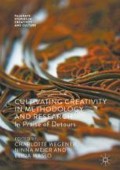Abstract
In this paper, I reflect on art, often perceived as imprecise and elusive when compared to science, as a theoretical framework in its own right, as a way of thinking and philosophizing, which stays close to, to paraphrase the philosopher Stanley Cavell, our “relationship to things as they are.” I do this in three steps. First, I present data from an ethnographic fieldwork on family perspectives on the obesity epidemic; then I will introduce my use of the novel The Virgin Suicides by Jeffrey Eugenides and drawings by the Australian-based artist Maria Speyer. I end with some reflections on art as a mode of relating to ethnographic data, which is very useful in phenomenological-oriented research.
Access this chapter
Tax calculation will be finalised at checkout
Purchases are for personal use only
References
Carsten, J. (2004). After kinship. Cambridge: Cambridge University Press.
Carsten, J. (2013). What kinship does – And how. HAU: Journal of Ethnographic Theory, 3(2), 245–251.
Cavell, S. (2005). Cities of words. Pedagogical letters on a register of the moral life. Cambridge: Harvard University Press.
Das, V. (1995). National honour and practical kinship: Unwanted women and children. In F. D. Ginsburg & R. Rapp (Eds.), Conceiving the new world order. The global politics of reproduction (pp. 212–233). Berkeley: University of California Press.
Eugenides, J. (1993). The virgin suicides. New York: Picador.
Grøn, L. (2017a). The weight of the family. Communicability as alien affection in Danish family histories and experiences of obesity. Ethos, 45(2), 182–198.
Grøn, L. (2017b). Slægt, hygge, tid og sted. Familieperspektiver på overvægtsepidemien. (Kinship, “hygge”, time and place. Family perspectives on the obesity epidemic). Tidsskrift for Forskning i Sygdom og Samfund, 26, 17–40.
Grøn, L. (2017c). The tipping of the big stone – And life itself. Obesity, moral work and responsive selves over time. Culture, Medicine and Psychiatry, 2(41), 267–283.
Grøn, L., & Meinert, L. (2017). Social contagion and cultural epidemics: Phenomenological and “experience-near” explorations. Ethos, 45(2), 165–181.
Jackson, M. (1989). Paths toward a clearing: Radical empiricism and ethnographic inquiry. Bloomington: Indiana University Press.
Lambek, M. (2011). Kinship as gift and theft: Acts of succession in Mayotte and ancient Israel. American Ethnologist, 38, 2–16.
Mattingly, C. (2017). Autism and the ethics of care: A phenomenological investigation into the contagion of nothing. Ethos, 45(2), 250–270.
Sahlins, M. (2013). What kinship is … and is not. Chicago: The University of Chicago Press.
Speyer, M. (2011). Bafflement and recognition. On drawing the figure with uncertainty and conviction. Master of Fine Arts Thesis. College of Fine Arts UNSW. See drawings at: www.mariaspeyer.com
Stevenson, L. (2014). Life beside itself. Imagining care in the Canadian Arctic. Oakland: University of California Press.
Stoller, P. (1997). Sensuous scholarship (contemporary anthropology). Philadelphia: University of Pennsylvania Press.
Strathern, M. (1996). Cutting the network. Journal of the Royal Anthropological Institute, 2, 517–535.
Waldenfels, B. (2007). The question of the other. Hong Kong: The Chinese University Press.
Waldenfels, B. (2011). Phenomenology of the alien: Basic concepts. Northwestern University Press.
Author information
Authors and Affiliations
Editor information
Editors and Affiliations
Rights and permissions
Copyright information
© 2018 The Author(s)
About this chapter
Cite this chapter
Grøn, L. (2018). The Wonder of Things as They Are: Theorizing Obesity and Family Life with Art. In: Wegener, C., Meier, N., Maslo, E. (eds) Cultivating Creativity in Methodology and Research. Palgrave Studies in Creativity and Culture. Palgrave Macmillan, Cham. https://doi.org/10.1007/978-3-319-60216-5_2
Download citation
DOI: https://doi.org/10.1007/978-3-319-60216-5_2
Published:
Publisher Name: Palgrave Macmillan, Cham
Print ISBN: 978-3-319-60215-8
Online ISBN: 978-3-319-60216-5
eBook Packages: Social SciencesSocial Sciences (R0)

